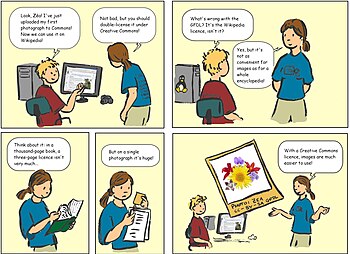User:Kjetil r/Commons:Lisenser
| Licensing in other languages: العربية | Asturianu | Беларуская | Беларуская (тарашкевіца) | Català | Čeština | Dansk | Deutsch | Ελληνικά | English | Esperanto | Español | Euskara | Suomi | Français | Galego | Alemannisch | עברית | Magyar | Bahasa Indonesia | Íslenska | Italiano | 日本語 | ភាសាខ្មែរ | 한국어 | Nederlands | Occitan | Polski | Português | Português do Brasil | Română | Русский | Slovenčina | Slovenščina | Svenska | Türkçe | Українська | Tiếng Việt | 中文 | 中文(简体) | 中文(繁體) | +/−
|
|
The Commons:Licensing page gives non-lawyers an overview of complicated copyright laws through an example-based tutorial. It aims to help uploaders decide whether an image or other media file is acceptable on the Wikimedia Commons. The Wikimedia Commons accepts only free content, that is, images and other media files that can be used by anyone, for any purpose [1]. The details are explained below. The Wikimedia Commons does not accept fair use justifications; see below for the reasons. Commons also does not accept noncommercial-only content. The license that applies to an image or media file must be indicated clearly on the image description page using a copyright tag. All information required by that license must be provided on the description page. The information given on the description page should be sufficient to allow others to verify the license status. It would be best to do this immediately in the summary field on the upload form. If you request permission from a copyright holder, please use the email template to do so. |

Acceptable licenses[edit]
All material on the Commons must be licensed under a free license that allows anyone to use the material for any purpose (see also Commons:Criteria for inclusion). In particular, the license must meet the following conditions:
- Republication and distribution must be allowed
- Publication of derivative work must be allowed
- Commercial use of the work must be allowed
- Acknowledgement of all authors/contributors of a work may be required.
- Publication of derivative work under the same license may be required.
- Use of open file formats free of digital restrictions management may be required.
The following restrictions must not apply to the image or other media file:
- Use by Wikimedia only (the only non-free-licensed exceptions hosted here as well are Wikimedia logos and other designs copyrighted by the Wikimedia Foundation that are the trademarks, service marks or other design elements that identify the sites of the various projects of the Wikimedia Foundation)
- Noncommercial/Educational use only
- Use under fair use restrictions
- Notification of the creator required, rather than requested, for all or for some uses
Specifically, the following are generally not allowed:
- Screenshots of software that is itself not under a free license. Screenshots of software under the GPL or a similar free software license are generally considered to be OK.
- TV Screenshots (programs and commercials).
- Scans or reproductive photographs of copyrighted artwork, especially book covers, album/CD covers, etc
- Copyrighted symbols, logos, etc
- Models, masks, toys, and other objects which represent a copyrighted work, such as a cartoon or movie character (rather than just a particular actor, regardless of a specific role)
The Commons obviously also allows all works that are not applicable to copyright (i.e. in the public domain). It is however unclear how material is to be handled that is in the public domain in some countries, but not in others. Please read the section about public domain below.
- ↑ This may be regulated by geographical, trademark, or other laws unrelated to copyrights, which Wikimedia Commons can not account for. Wikimedia Commons tries to ensure that any such restrictions are mentioned on the image description page; however, it is the responsibility of reusers to ensure that the use of the media violates no applicable law. In particular, copyrights of certain material may have expired in one country while still applying in another. Furthermore, many commons licences, such as GFDL and Creative Commons Share-Alike, require that any derivatory work must be released under the same license conditions